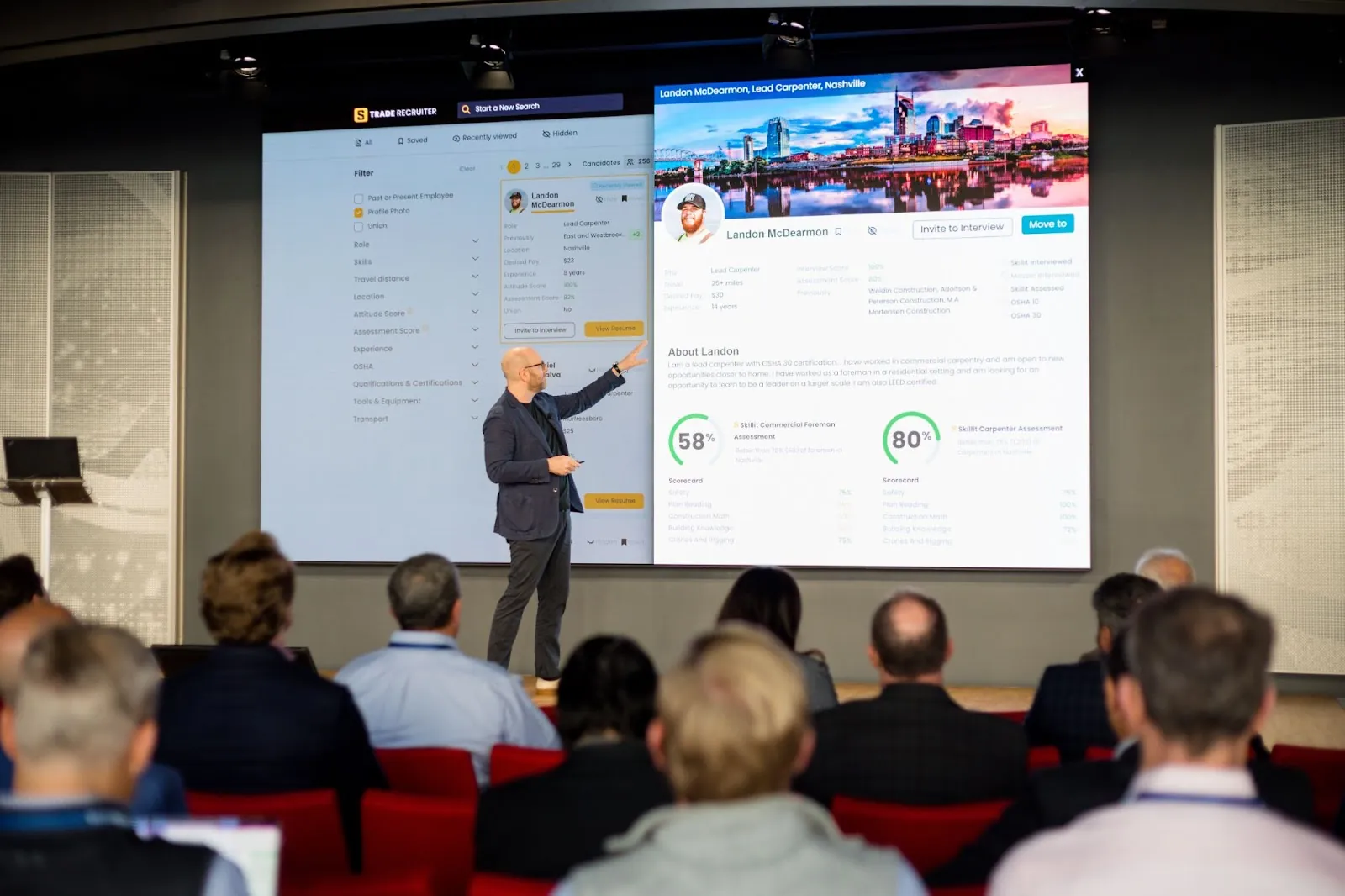Our mission at Building Ventures is to create a better built world, and there’s no way to do that without addressing and improving construction’s labor crisis. This is exactly why we’re excited to share our recent investment in Skillit, the new way to hire and retain skilled trades.
For the past 30 years, software developers have almost exclusively built tools to empower their white-collar peers, making them easily discoverable online and fast and cost-efficient to hire. However, for blue-collar industries that hire deskless workers—construction companies, for example—hiring workers is incredibly slow, labor-intensive, and expensive because the labor supply lives mostly offline.
To make matters worse, the tools hiring managers are forced to use are siloed, makeshift and fragmented in nature. Historically, solutions fall into one of three categories:
- Online marketplaces that essentially provide a surface-level matchmaking service but fail to properly digitize the worker’s profile and do nothing to improve hiring workflows or outcomes.
- Traditional staffing solutions that provide access to on/offline talent pipelines but are inherently expensive and don’t touch hiring workflows.
- Generic applicant tracking tools that attempt to streamline hiring workflows but fail to meet the unique requirements of hiring deskless workers or provide access to offline talent pipelines.
These solutions fall short of fixing the broken system because they fail to appreciate the needs of both the hiring managers and the skilled laborers. The main reason why hiring deskless workers remains broken is because nobody has taken a holistic approach to understanding the problem.
The scale of this problem is significant: 80% of the global workforce is deskless. From construction and manufacturing workers to drivers and delivery people, the deskless workforce makes daily life possible, and yet remarkably these workers have been mostly left behind by digitization.
While digitization hasn’t served skilled workers, it has certainly impacted these largely deskless industries, including construction. Skilled workers, emboldened by real and perceived labor shortages, and conditioned by streaming services and the on-demand economy, are demanding a faster, smoother hiring experience, one that only technology can provide. On top of this trend, record-high and worsening labor shortages are making it increasingly expensive to hire and retain skilled workers. In fact, nearly 90% of construction companies today report employee hiring and retention as their biggest business challenge.
These are the construction labor challenges that Skillit solves. Skillit replaces multiple on/offline activities and categories of tools typically used by construction companies with a single platform. For now the focus is on the biggest and most urgent problem facing construction companies: the recruitment and retention of skilled labor. Skillit’s platform provides companies with vetted candidate profiles, custom matches, and automated workflows, as well as data-backed salary insights. This makes the process smoother, quicker, and more successful for the company looking to fill a role—and this improves the experience for the skilled worker trying to find the right fit.
Long-term, the company aims to own the labor-related workflows of construction companies. Owning all the labor-related workflows would not only provide visibility into the full lifecycle of an employee, but also provide access to a highly contextualized treasure trove of performance data that can be used to improve recruitment and retention outcomes. For example, by digitizing skills assessments during the recruitment phase, Skillit is able to quantify the strengths and weaknesses of a candidate and provide customers with targeted training solutions. These naturally lend themselves to evaluation tools for new hires and managers to agree on what success looks like and improve retention outcomes downstream. While at the exit / retention stage, early warning and win-back systems can reduce churn. Even more, collecting the data from these alerts can inform and improve candidate profiling and hiring outcomes upstream. This end-to-end approach will provide superior workforce ROI for its customers—and help improve both the employee experience for skilled workers and hiring challenges for construction companies.
When we met Skillit founder & CEO Fraser Patterson, we were impressed by his passion for solving construction’s labor problem, his conviction in data empowering hiring managers and employees alike, and his background. Fraser’s experience as both a former journeyman carpenter and general contractor hiring labor uniquely qualifies him to launch a startup in this space. As we spent time with Fraser, over many calls and a trip to visit him and his family at their home in NYC, we realized he didn’t just love the problem—he had a solution. Meeting the rest of the founding team only cemented our confidence in Fraser and in Skillit. A uniquely prepared founder joined by great early team members—all with the knowledge, passion and solution for a really big problem. Sign us up for the journey!

Skillit CEO Fraser Patterson presenting at our BVIN Fall Summit 2022.
That’s why we’re thrilled to announce that we led Skillit’s $5.1 million seed round, with participation from MetaProp, Holt Ventures, Great North Ventures, 1Sharpe Ventures, and Takeoff Capital. You can read more about the deal here, and I encourage you to check out Skillit, too.
We have already witnessed genuine excitement by many of our general contractor partners upon learning about Skillit, and we’re excited for what’s to come. This new infusion of capital will enable Fraser and the Skillit team to open new regional markets, refine the product offering informed by real customer usage, and ultimately move the recruitment and retention of skilled construction labor into the 21st century. Let’s GO!!


